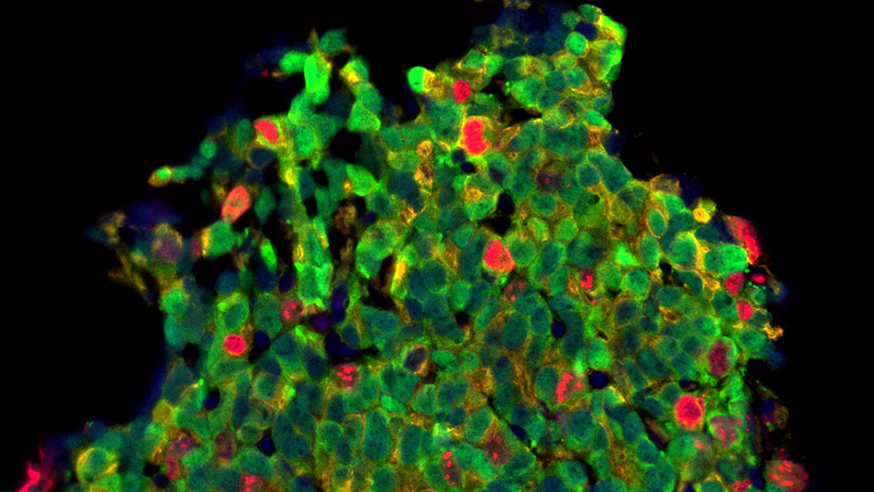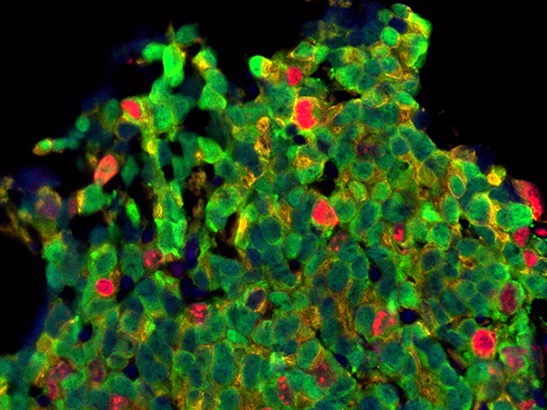
Treated prostate cancer cells (photo: Mateus Crespo/Professor Johann de Bono, the ICR)
Genetic testing in men with advanced prostate cancer could pick up a significant proportion whose disease may be caused by inherited mutations in genes involved in repairing DNA damage, a major new study reveals.
Testing prostate cancer patients for mutations in key DNA repair genes could identify those who may benefit from precision treatments that specifically target DNA repair weaknesses in cancer cells.
Some 12% of men with advanced prostate cancer in the study population were found to have inherited mutations in one of several genes involved in DNA repair — such as the breast cancer gene BRCA2.
The researchers, whose study is published in the prestigious journal The New England Journal of Medicine on Wednesday 6 July 2016, believe that genetic testing could form a valuable part of the treatment pathway for advanced prostate cancer.
A team at The Institute of Cancer Research, London, and The Royal Marsden NHS Foundation Trust, with colleagues at seven other world-leading cancer centres in the US, used a simple saliva test to analyse the DNA of patients.
Inherited mutations
They examined the DNA code of 20 genes known to have a role in DNA repair in 692 men with advanced prostate cancer.
Some 12% of men had at least one ‘germline’ mutation in a DNA repair gene — meaning an error that is either inherited or developed before birth. The most commonly defective gene was BRCA2, which was mutated in 5% of men.
Men who have inherited mutations in certain DNA repair genes may benefit from treatment with new drugs called PARP inhibitors, which exploit weaknesses in the processes for DNA repair within cancer cells.
Professor Johann de Bono discusses the context of his research in a video by Prostate Cancer UK.
Where BRCA2 mutations are detected in men with advanced prostate cancer, the study opens up the possibility that relatives could also be tested for BRCA2 mutations. More research is needed to clarify the role of the other DNA repair genes in causing prostate cancer and the implications for testing.
The study is the largest of its kind to date, and the first to comprehensively analyse germline mutations in men with advanced, or metastatic, prostate cancer — where the disease has spread around the body.
‘Important implications’
The study was funded by the Prostate Cancer Foundation and Stand Up to Cancer; through a Movember and Prostate Cancer UK grant to The London Movember Centre of Excellence; through the Experimental Cancer Medicine Centre at the ICR and The Royal Marsden; and by Cancer Research UK, the Medical Research Council and the National Institute for Health Research Biomedical Research Centre at The Royal Marsden and the ICR.
Professor Johann de Bono, Professor of Experimental Cancer Medicine at the ICR, and Consultant Oncologist at The Royal Marsden, who led the study in the UK, said: “Our study has shown that a significant proportion of men with advanced prostate cancer are born with DNA repair mutations — and this could have important implications for patients.
“Genetic testing for these mutations could identify men with advanced prostate cancer who may benefit from precision treatment. We could offer these men drugs such as PARP inhibitors, which are effective in patients with certain DNA repair mutations and are showing important anti-tumour activity in ongoing clinical trials.
Genetic markers ‘desperately needed’
“Where we find BRCA2 mutations, we could also offer genetic testing and counselling to relatives of the patient to consider how we can reduce their cancer risk. We also need to establish the impact of having DNA repair defects on survival in men with prostate cancer, and whether we can predict who will develop severe disease, so we can design new treatment strategies to cure this disease.”
Professor Paul Workman, Chief Executive of the ICR, said: “This valuable study has given us new insights into the causes of aggressive forms of prostate cancer that have spread round the body. It suggests testing for inherited DNA repair mutations could become an important stage in the treatment of men with advanced prostate cancer, by helping direct use of targeted cancer therapies.
“There is huge diversity in prostate cancers from patient to patient — some men live for decades with localised tumours, while in others cancers develop rapidly and spread round the body. Genetic markers that can detect the patients at high risk are desperately needed to improve men’s survival chances.”
